HIT CHANNEL EXCLUSIVE INTERVIEW: March 2023. We had the great honor to talk with a legendary double bassist and composer: Ron Carter. He is best known as a member of the Miles Davis Quintet. He has pursued a very successful solo career and has collaborated with Paul Simon, Aretha Franklin, Chet Baker, Wes Montgomery, Sam Rivers, McCoy Tyner, Stan Getz and many others. The critically acclaimed documentary “Ron Carter: Finding the Right Notes”, directed by Peter Schnall is out. Read below the very interesting things he told us:
You keep a low profile in your personal life. Did you have any misgivings about being the subject of a documentary before the making of “Ron Carter: Finding the Right Notes”?
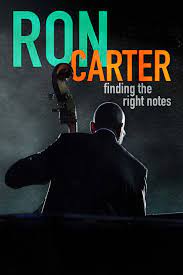 I was concerned about how much of my personal life they wanted to show; I was very concerned with how they present my personal life that I didn’t want to make public and I hoped that they would make editing of all the various events when they saw me over that period of time. They would recognize and identify with what my personality was like and my personal events were like. When I asked them not to show that, they wouldn’t show that because they felt the same kind of empathy. I trusted them and it came out really well.
I was concerned about how much of my personal life they wanted to show; I was very concerned with how they present my personal life that I didn’t want to make public and I hoped that they would make editing of all the various events when they saw me over that period of time. They would recognize and identify with what my personality was like and my personal events were like. When I asked them not to show that, they wouldn’t show that because they felt the same kind of empathy. I trusted them and it came out really well.
Are you satisfied with the response you got so far for the documentary “Ron Carter: Finding the Right Notes”?
I’m very disappointed that it hasn’t been released in Europe and Far East, Japan for example. I am not quite sure what the process is but they told us that within that period of time, whatever that is, they will release it in Europe and Japan, but it hasn’t happened and they are missing it greatly. They told me that they don’t have the product, in this case the documentary, in a much wider audience and I think if they were getting anywhere else. I’m disappointed.
In the documentary you say that there are still notes to be discovered by you. Is it the main motive for keep playing?
I am looking for a new order of the notes. It’s a better way to say that. But it’s both: It’s the right note at the right time.
How emotional was it for you to play the 85th Birthday Celebration concert at the Carnegie Hall on 10th May 2022 with Stanley Clarke and Buster Williams?
They are my friends and I am never embarrassed in front of my friends. They know me, I know them, we love each other, we have the same interest in many areas of our lives. I was proud to have them in my corner.
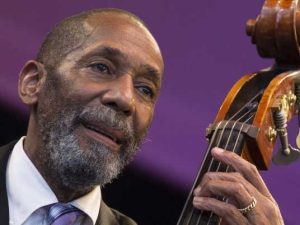 I love your composition “Cut and Paste” from “Dear Miles” (2007) album. What was your inspiration for that piece of music?
I love your composition “Cut and Paste” from “Dear Miles” (2007) album. What was your inspiration for that piece of music?
Before they had computers and stuff when you wanted to make a piece, in some sections you were doing your own editing, you had to cut it out and paste it where it belonged in your score. I did this piece to say that I’ve found some fragments of ideas, that they were all good by themselves, they were very rare diamonds to me as melodies. I ‘ve spent some time looking at them, playing them and reading them too and I decided that I needed a different order for these fragments to be a better piece. Hence “Cut and Paste”.
Your priority is to make other people sound good. Does it come naturally to you or it requires some kind of exercise too?
I think that’s part of the job. I’ve been working as a sideman. The sideman’s job is to have people who call him, strangers or friends, to do their project, they call him because they feel he is able to make the project get to a different level, a different concept, a different development than their musical hopes. So, of course when they call me my primary job is to do the best I can and if allowed, I can give them what I think it is gonna be better than what they have or adopt some of my concept until they are feeling like this (ed: He unites the fingers of each hand, putting one hand diagonally opposite to the other). If I am able to do that, they call me back for another project. So, that’s my job.
Is there right or wrong in jazz? Miles Davis said: “Do not fear mistakes, there are none”.
Well, there are some terrible notes; I am not sure what he was hearing. Right now, of course, he is not hearing and I am still hearing. There are some terrible notes that the guys play, for whatever reasons. There are 8, 15 reasons why it’s the wrong note. In addition, I want to say that, it’s the right note at the wrong time.
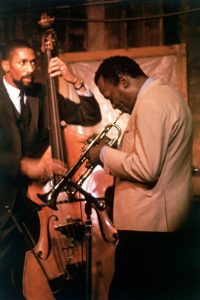 You have said that playing with Miles Davis you learned to see the big picture. How did you achieve that considering that he never told you what to play or how to play?
You have said that playing with Miles Davis you learned to see the big picture. How did you achieve that considering that he never told you what to play or how to play?
I think he trusted my judgment and my sense for looking for a better connection of notes. Rather than needed to be told, I encouraged to look for them and he understood instinctively this view of the band members. I’ve been a sideman for a lot of recordings and gigs. I made the point to pay attention to how they do the same thing: How they manage the crowd, how they plan the program, how they let a song to go longer or shorter, how they treat the sidemen when they are on the bandstand. That’s all a part of this “big picture”, of being a successful sideman that people look for to working with. Not because I am famous; because how I treat them.
During the period the Miles Davis Quintet played at the Plugged Nickel in Chicago in 1965, your son, Myles, was born in New York. What solution did you come up with in order to be close to your family?
At the time, there were many flights leaving New York and go everywhere: Chicago, Detroit, wherever. I just walked out and took a 1:00 am flight after the gig in Chicago. I could be in New York 2 ½ hours later for my son’s wake-up call or the breakfast at 5:00 am and I would give us a meal with my wife and our 2-year old son and then I would take them out or go to the Manhattan for a class I had. I ‘d take a 7:00 pm plane back to Chicago because there is an hour difference and I would get there just in time to open my bass case and get it out of it. I did that for three nights.
Why the first take in a recording session is always the best?
I think the first take is everyone playing the music. The second take they are playing themselves and I think that it is a disastrous way to get discovered.
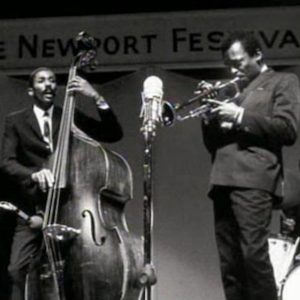 How much artistic freedom do you have as a sideman on other people’s records?
How much artistic freedom do you have as a sideman on other people’s records?
I have as much freedom as the subject would allow. They call me to do what I can do to help them and their project. Of course, I am concerned with overplaying or being not a pleasure enough for what the part requires. Based on my experience, I want to be able to be back for the next job for the same client. Being a sideman for over 60 years or so, I understand when the right time is to “let’s all hang out” and the time when you wanna keep the men’s mouth shut. I learned those times.
Why taking composition lessons is essential for a jazz musician?
I think right now we are in a phase in music when musicians are interested in being what they call “free” of constraints of European styles and methods of composition, notation and stuff. I think I appreciate that daring to be something different, something that none else is doing. I feel in this case, is like running music. I think everything has an order, whether you like it or not, and sometimes the best way to get a point across is to use the order of the day and you have to do that. In this case, to learn how to compose and what forms are and learn what sheets of music are and can conform with his/her teacher when he/she tells you that that is not a very good song for these real basic reasons. Maybe your composition will be better than someone else’s and be successful; it will have a longer lifespan if you have longer legs when it gets out in any public hearing. But you may be more productive and you may actually find other way to make your songs in your head more available to a wider public and musicians.
You are very active on the Internet with your website https://roncarterjazz.com and social media accounts. How much does it help to attract new people to your music?
Given that jazz is not on people’s top level of interest in listening to music, the more ways we have found and are available to us to make our audience stay the same size and in fact grow is by the social media blitz. I have people who are working with me who are making that possible. It isn’t new fans in themselves, but the audience in themselves for other jazz musicians. The jazz community is now able to take advantage of the social media available to them and then draw people who might never know them. This is critical.
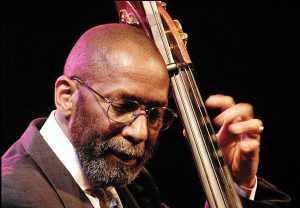 It seems that you love having numbers as song titles (“595”, “117” “Eighty-One”). Do these numbers have a special significance for you?
It seems that you love having numbers as song titles (“595”, “117” “Eighty-One”). Do these numbers have a special significance for you?
No, that I know, but I had to find them, so I’d make some money real fast. They are good lottery numbers, you know.
In Miles Davis’ “Filles de Kilimanjaro” (1968) you played electric bass and Dave Holland played double bass. Was that your decision?
No, it was Miles. He just wanted two different sounds at the same time, I guess. It was Ok. Dave and I, we are both good players and sensitive to the needs of music. You have two guys playing in the same range of the same instrument, I think we were curious as everybody else as to how it could work. And it did, I think.
I read a Keith Jarrett (Miles Davis –piano) interview and he said that he loved Sam Rivers’ “Fuchsia Swing Song” album (1965) you played with Tony Williams and Jaki Byard (piano). Do you have any memories from the sessions of that album?
Sorry, I looked for that to find an answer for you (ed: I had sent the questions some days before the Zoom interview) but I didn’t know how to find it. My attempt wasn’t successful. All I can remember, was Jaki Byard was able to play all the styles on the piano in one chorus and if Keith Jarrett is interested in the piano history, then it would be a good record for him to hear the development and you are in awe with the piano from the same guy within next four minutes. Great record. Good for him.
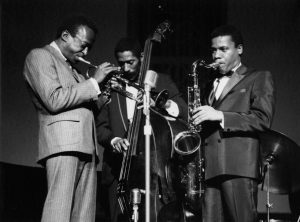
Your former bandmate Wayne Shorter passed away some days ago. Would you like to tell us a few words about him?
Well, he passed away but his music has got a life of its own. Wayne’s concepts of beauty, love, respect, grace, all the things that Wayne was, as he was on this planet, same as his music and when people don’t know how to define this because it is being played by Wayne, it’s enough, I think. This is his mark in the sand and it will never go away because Wayne Shorter played it and Wayne Shorter wrote it. I’ m happy to have been associated with him. I saw him a couple of times in the past year, just were some Zoom events that we were doing; I love him and I really miss him every day because I can’t talk to him right now, but I’ve got records that I’ve made with him and I’ve got records that he made with other people and that’s my way in staying in touch with him.
Do you have any musical ambitions left?
I’m gonna work in two weeks with Rosa Passos and Kenny Barron for two nights in New York. My ambition is to play so they will want to come back for the next gigs, my ambition is to find a different arrangement of notes that last when I will play with her. My ambition is leaving the concert to feel that I did my job. It was as good as I could play. I played as much of me as the music would allow. I helped those people who hired me and went on stage for two nights, to feel happy that I was able to get the music have another life. I’m looking for that.
Are you optimistic about the future of jazz music?
Yes, I have confidence. I’m back to teaching again. I have two or three students who can be very good players if they follow some certain instructions. I think the same honest truth is for saxophone players, drummers and pianists whose teacher recognizes, and I’m sure that these special people would get the encouragement from their peer, as one of their mentors, to keep playing this music. And that’s everywhere, not just in New York. Everywhere there are kids like these. I have no fear that the music will be around for a really long time.
You have recorded thousands of records. Do you think because of the streaming services listening to an album from start to finish is now becoming a lost art?
Well, I’ll quote a newspaper, I got an article on my computer that says: “Vinyls are now outselling CD’s”. Good for us. I thought the people who have a turntable and need a needle like this when they play it, wouldn’t be here for a long time and right now the vinyls are at and they are just taking over the scene. Good for them, good for us.
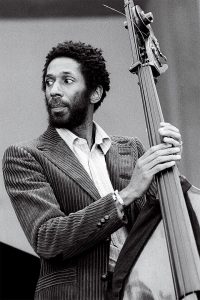 Is it flattering that younger bass players as Stanley Clarke, Leland Sklar, Victor Wooten and Nathan East admire you?
Is it flattering that younger bass players as Stanley Clarke, Leland Sklar, Victor Wooten and Nathan East admire you?
On my computer screen, I have a shade and I close it down when I start to get embarrassed. So, right now, I pull the shade –I have a nice paint that you cannot see (ed: on Zoom), but I see it there. The admiration and the respect for what I’ve tried to do when the bass comes out of the case are amazing and appreciative. They understand what it takes because they are good players. I ‘m glad they feel that we are of the same ilk.
Miles Davis writes in his autobiography that he had jammed many times at his home with Jimi Hendrix and at the time of Jimi’s death in London, Miles along with Gil Evans were waiting for him in New York. Have you ever heard anything about this? Had you met Jimi Hendrix?
No, I had never met him and I don’t know this meeting. It could have been in the works. It could have been possibilities that I wasn’t aware of them at all.
A huge “THANK YOU” to Mr. Ron Carter for his time.
Official Ron Carter website: https://roncarterjazz.com
Official Ron Carter Facebook page: https://www.facebook.com/RonCarterMusic
Official Ron Carter Youtube channel: https://www.youtube.com/c/roncarterbassist
Official Ron Carter Twitter page: https://twitter.com/RonCarterBass

